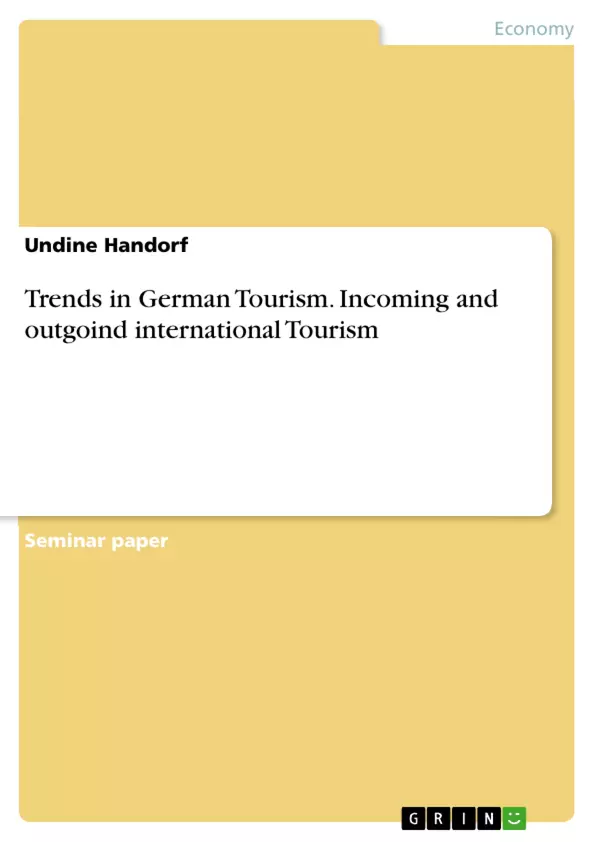The aim of this seminar paper is to examine quantitative aspects of the German inbound and outbound tourism and to deal with trends affecting the tourism industry.
The author mainly concentrates on the follow questions:
- How does the German inbound tourism look like and how does it influence German economy?;
- How does the German outbound tourism look like and which are the main kinds of transport Germans use to travel?;
- What are the main trends affecting German tourism customers, products and marketing?
Inhaltsverzeichnis (Table of Contents)
- 1. Introduction
- 2. Incoming Tourism
- 2.1. Source markets.
- 2.2. Tourist entries by accommodation used
- 2.3. Tourist entries by means of transport used for entering the country..
- 2.4. Motivations and purposes for travelling to Germany
- 2.5. Types of booking when travelling to Germany.
- 2.6. German Inbound Business Travel.....
- 2.7. The importance of tourism for the German economy...............
- 3. Domestic and international tourism...
- 3.1. Development of travel propensity in and outside Germany between 1954 and 2010.................
- 3.2. Means of transport.
- 3.3. Accompanied travel
- 3.4. Main holidays and additional holidays......
- 3.5.Time of travel
- 3.6. Duration of German holidays...
- 3.7. Motivations of Germans travelling in and outside Germany
- 3.8. Different travel behaviour between West Germans and East German.....................
- 4. Trends in German Tourism
- 4.1. Trends in consumer …………………………………………….....
- 4.2. Trends in products.
- 4.3. Trends in marketing.
- 5.Conclusion.........
Zielsetzung und Themenschwerpunkte (Objectives and Key Themes)
This seminar paper aims to explore quantitative aspects of German inbound and outbound tourism and analyze trends impacting the tourism industry. The focus is on understanding the nature of German inbound tourism, its economic impact, the characteristics of outbound tourism, and major trends affecting consumers, products, and marketing in the German tourism sector.
- Growth and trends in German inbound and outbound tourism
- Economic significance of tourism for Germany
- Key source markets for German tourism
- Factors driving travel behavior and motivation among German tourists
- Trends in consumer preferences, tourism products, and marketing strategies within the German tourism industry
Zusammenfassung der Kapitel (Chapter Summaries)
The paper begins by introducing Germany as a diverse and popular tourist destination, both for international visitors and domestic travelers. It highlights the significant economic contribution of tourism to the German economy. The next section delves into inbound tourism, analyzing its growth, key source markets, and the importance of international tourism for Germany. This section further explores the role of different types of accommodation and transportation, tourist motivations, and booking patterns.
The paper then transitions to discuss domestic and international tourism within Germany, examining travel propensity, transport choices, travel patterns, and motivations of German travelers. The final chapter focuses on identifying key trends affecting the German tourism sector, examining changes in consumer behavior, product offerings, and marketing strategies.
Schlüsselwörter (Keywords)
The key themes of this seminar paper include inbound tourism, outbound tourism, economic impact, source markets, travel behavior, motivations, consumer trends, tourism products, marketing strategies, and the German tourism industry.
Frequently Asked Questions
How important is tourism for the German economy?
Tourism is a significant economic driver in Germany, contributing substantially to GDP through both international visitor spending (inbound) and domestic travel.
What are the main source markets for German inbound tourism?
Germany attracts visitors from all over the world, with key markets including European neighbors and an increasing number of travelers from overseas seeking business and leisure opportunities.
What are the current trends in German tourism products?
Trends include a shift toward more sustainable travel, personalized experiences, and the growing importance of digital booking platforms and mobile marketing.
How do Germans prefer to travel for their holidays?
The paper analyzes travel propensity and shows that while cars remain popular, there is a diverse use of transport including trains and planes for both domestic and international trips.
Are there differences in travel behavior between East and West Germans?
Yes, the study examines historical and contemporary data showing evolving patterns in travel behavior and preferences between the two regions since reunification.
- Citation du texte
- Undine Handorf (Auteur), 2011, Trends in German Tourism. Incoming and outgoind international Tourism, Munich, GRIN Verlag, https://www.grin.com/document/337595



